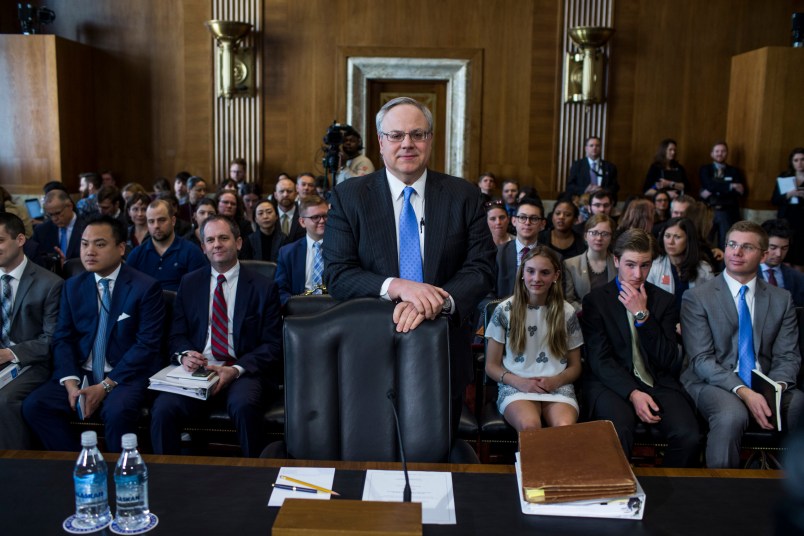Newly released daily schedules from acting Interior Secretary David Bernhardt show hundreds of differences from schedules his department previously released publicly, and include meetings between Bernhardt and people with ties to his former lobbying clients.
President Donald Trump has nominated Bernhardt to formally become Interior secretary. The Senate Energy and Natural Resources Committee last week voted 14-6 to advance the former lobbyist to a full Senate vote. That same day, the New York Times reported on a previously undisclosed invoice from Bernardt for “federal lobbying” dated March 2017, several months after he filed documents saying he would no longer lobby the government.
According to analyses by Roll Call and CNN, the 439 new pages of Bernhardt’s daily schedules between September 2017 and November 2018 show hundreds of new details or disclosures about his meetings as DOI deputy secretary and acting secretary, including some related to his former lobbying clients.
On Feb. 27 last year, for example, Bernhardt met with the chairman of the Center for Environmental Science, Accuracy and Reliability, a business-friendly group that fights environmental regulatory moves. Bernhard served as a director at the group until joining the Trump administration, Roll Call noted. Interior Department spokesperson Faith Vander Voort told the outlet that the meeting did not occur at the time and day listed on Bernhardt’s newly released schedule.
She told CNN that the newly released schedules — which are referred to as “daily cards” — are often “outdated by midday.”
CNN flagged an April 12 meeting Bernhardt had — one previously listed publicly as “personal” — with Lynne Hackedorn, who at one point was vice president of government affairs at Cobalt International Energy, a former Bernhardt client.
Roll Call noted two meetings in May, one each with executives from Shell Oil and Cimarex Energy, a natural gas company. Neither Shell or Ciramex were direct Bernhardt clients, Vander Voort told Roll Call. But they each belonged to industry groups for whom Bernhardt worked as a lobbyist. “The [ethics] recusal does not automatically extend to all members” of such industry groups, Vander Voort argued.
The fight to reveal Bernhardt’s true daily schedules has gone on for several weeks. Responding to a request from House Natural Resources Committee Chairman Raúl Grijalva (D-AZ) in February, Bernhardt claimed “I have not personally maintained a calendar for years.” He acknowledged that “[n]umerous people create calendar entries on what can be labeled my calendar to maintain a schedule for the organization of daily appointments,” but that the calendar details “are publicly provided.”
On March 27, The Washington Post reported that Bernhardt Democratic lawmakers were looking into a tip that Bernhardt’s schedule was really an ever-changing virtual document that was erased and written over every day. Per the Post:
The existence of his cards came to light in November in the course of a public-records request by a researcher. Two months later, Freedom of Information Act officers at Interior informed him that staffers had to take a tedious step to fulfill his request: They had to go back and look at version histories of the same Google document, which changed every workday, dating back for months because it had been overwritten.
Grijalva told CNN, in response to the new schedule documents, that he hoped “they’ve had an epiphany, that they understand that these requests, the requests the committee’s making, are not burdensome.”
“I think they came to the realization that, if pressed on the issue, they would have to release them anyway,” Grijalva said.







Is this a surprise to anyone? Anyone?
Grifters gotta grift.
Without ethics. Without morals. Without a conscience. Without a respect for law. Without a soul.
Do they still chant “Drain the Swamp!” at his
psycho-dramasrallies?These days they should be chanting: “Swamp R Us!”
And McConnell’s gotta rubber stamp.